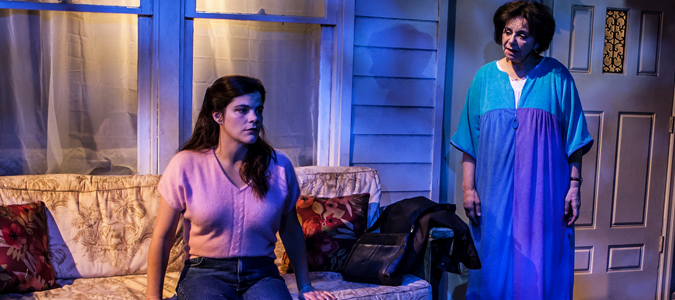

Nice Girl
Opening Night: May 7, 2015
Closing: June 14, 2015
Theater: Bank Street Theatre
In suburban Massachusetts in 1984, thirty seven year old Josephine Rosen has a dead end job, still lives with her mother, and has settled into the uncomfortable comfort of an unintended spinsterhood. But when a chance flirtation with an old classmate and a new friendship at work give her hope for the possibility of change, she dusts off the Jane Fonda tapes, and begins to take tentative steps towards a new life. A play about the tragedy and joy of figuring out who you are and letting go of who you were supposed to be. A new play by Melissa Ross (“Thinner Than Water”).
BUY TICKETSREAD THE REVIEWS:
May 27, 2015
Sadness sits lightly on the small shoulders of Josephine, the heroine of “Nice Girl,” a tenderly drawn drama by Melissa Ross about stunted lives in a middle-class suburb of Boston. Josephine, known as Jo and portrayed with fine delicacy by Diane Davis, goes about her daily business without drawing attention to the hole in her heart. She cooks and cares for her mother, Francine, and dutifully performs her secretarial chores at an accounting firm. But in moments of repose and reflection, tears spring to her eyes, and the life she might have led seems to shimmer before her like a mirage. At 38, Jo still lives at home with her mother (Kathryn Kates), in a modest tidy house (the versatile set, by David Meyer, expertly captures the social milieu). Some 20 years earlier, Jo left home to attend Radcliffe on a scholarship, but when her father died she left school to help take care of her mother and just never went back. Now she seems to have lost all hope of moving on, moving forward or even moving out, although she makes idle threats to do so when tensions flare up with Francine. They do on a daily basis, since the dyspeptic Francine, played with a hilariously sour edge by Ms. Kates, isn’t the easiest woman to get along with. Vaguely ailing but refusing to see the doctor — because she doesn’t want to hear any good news, Jo thinks — Francine rarely leaves the house, or even the housecoat that is her daily uniform. Both possessive and passive-aggressive, she needles Jo about her humdrum life but makes biting remarks when, for a change, Jo starts up a couple of new friendships.
READ THE REVIEW


















